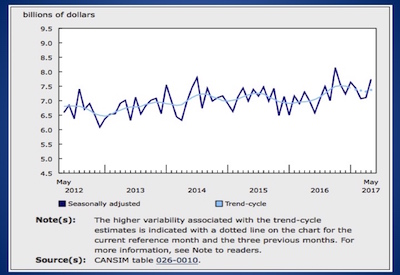Value of Building Permits Rises 8.9% in May

July 17, 2017
Canadian municipalities issued $7.7 billion worth of building permits in May, up 8.9% from April and the third highest value on record. The national increase was mainly the result of higher construction intentions for residential buildings, particularly in Ontario. Seven provinces registered gains in the total value of building permits in May, and every building component increased except institutional structures.
Residential sector: both multi-family and single-family components report higher construction intentions
The value of residential building permits issued by Canadian municipalities increased 10.8% from April to $5.0 billion in May. Six provinces registered gains, with Ontario reporting the largest increase, followed distantly by Alberta and British Columbia.
The multi-family component rose 15.0% to $2.3 billion, following a 6.9% gain in April. Construction intentions were up for every type of multi-family dwelling, led by row houses. Meanwhile, the value of single-family building permits rose 7.4% to $2.7 billion in May, stemming mainly from single homes in Ontario.
Canadian municipalities approved the construction of 18,037 new dwellings in May (up 7.2% compared with April), consisting of 12,032 multi-family units (+11.8%) and 6,005 single-family units (-1.0%). Ontario contributed the most to the increase in new dwellings approved in May, bringing the year-to-date number of new dwellings approved in that province to 35,860. In comparison, Ontario approved the construction of 30,661 new dwellings from January to May 2016.
British Columbia reported a second consecutive monthly gain in new multi-family units approved following a notable decrease in March 2017, while over 100 new multi-family units were approved in Prince Edward Island for just the fourth month since January 1989.
Non-residential sector: commercial and industrial components register increases
The value of building permits issued for non-residential structures rose 5.6% in May to $2.7 billion, marking a third consecutive monthly increase. Alberta and New Brunswick led the five provinces that posted gains in the non-residential sector in May.
The commercial component rose 12.9% in May to $1.5 billion, as increases were registered across several building categories, led by retail and wholesale construction intentions. Every province except Nova Scotia and Alberta reported gains in the value of commercial building permits.
The industrial component rose for a third consecutive month, up 9.8% in May to $545 million. This increase was mainly due to higher construction intentions for maintenance buildings in Ontario.
In contrast, the value of building permits issued for institutional structures fell 9.1% to $719 million. This followed notable construction intentions in April for government administration buildings and medical facilities.
Provinces and census metropolitan areas
The total value of building permits rose in seven provinces in May, led by Ontario and Alberta. Meanwhile, construction intentions were up in 22 of 36 census metropolitan areas (CMAs), led by Hamilton, Toronto, Calgary, and the Ontario part of Ottawa-Gatineau.
In Ontario, the gain in May stemmed primarily from the residential sector, the result of increases in both the multi-family and single-family components in the Toronto CMA. The industrial component in Ontario rose for a third consecutive month, with the gain in May mostly attributable to higher construction intentions for maintenance buildings in the Hamilton CMA. The commercial component, specifically the hotel and restaurant category, led the increase in the total value of building permits in the Ontario part of the Ottawa–Gatineau CMA.
The increase in construction intentions in Alberta in May stemmed from institutional structures, as well as multi-family dwellings. This gain coincided with a notable increase in the multi-family component in the Calgary CMA, but was moderated by the Edmonton CMA, which registered lower construction intentions in all building components for the month, except institutional structures.
Fort McMurray
May 2017 marks the one-year anniversary of the start of the 2016 Fort McMurray wildfire.
During this period, the municipality of Wood Buffalo issued record levels of both the unadjusted number of building permits and the unadjusted value of building permits for residential dwellings.
In the 12 months to May, 1,817 residential building permits worth $493 million were issued for Wood Buffalo, compared to an annual average of 1,311 residential building permits totalling $194 million since the beginning of the 21st century. In May 2017 alone, Wood Buffalo issued 305 residential building permits worth $92 million, the highest monthly levels for this municipality since January 2000.
Source: Statistics Canada, www.statcan.gc.ca/daily-quotidien/170706/dq170706b-eng.htm.





![Guide to the Canadian Electrical Code, Part 1[i], 26th Edition– A Road Map: Section 56](https://electricalindustry.ca/wp-content/uploads/2022/11/Guide-CE-Code-2-768x432.png)




![Guide to the Canadian Electrical Code, Part 1[i], 26th Edition– A Road Map: Section 56](https://electricalindustry.ca/wp-content/uploads/2022/11/Guide-CE-Code-2.png)



